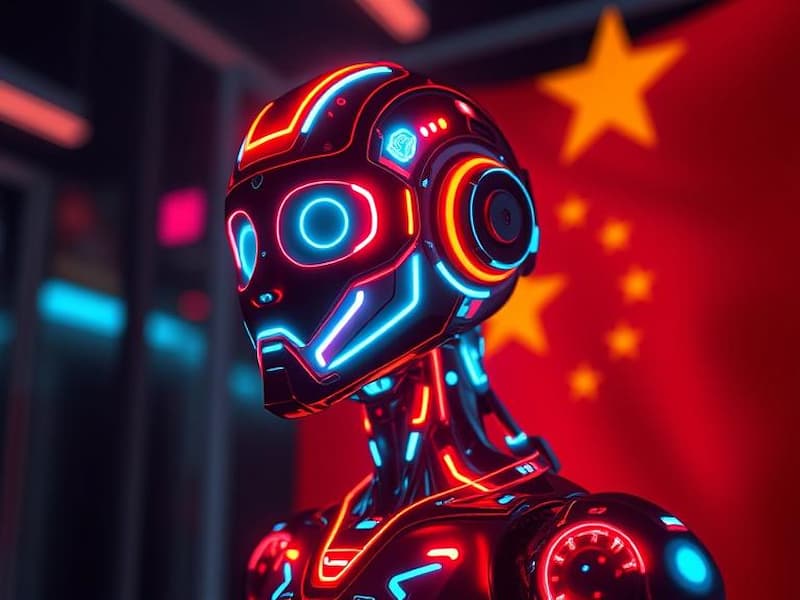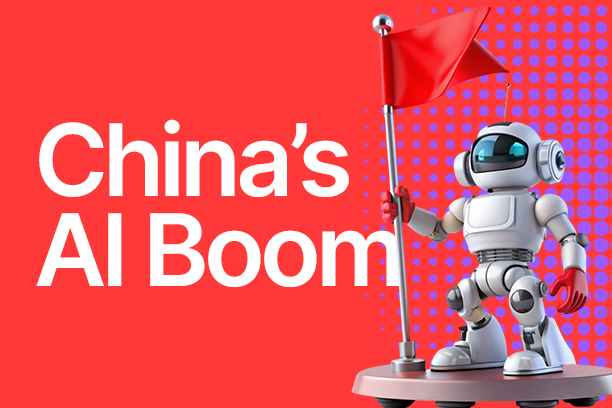For years, China has been portrayed as a follower rather than a leader in technological innovation, often seen as merely replicating Western advancements. However, this narrative is rapidly changing. China is now a global powerhouse in artificial intelligence (AI), blockchain, and advanced computing, making leaps that many in the West fail to recognize.
AI and technology expert William Laurent shared his perspective on China’s dominance in AI-driven industries, blockchain innovations, and financial technology, emphasizing that the country is not just competing but leading the way.
“China isn’t just copying technology anymore—they’re leading in innovation. From AI to electric vehicles, they’re executing at a level that the West should be scared of,” William stated.
While Western nations are entangled in debates over AI regulations and ethical concerns, China has moved swiftly. It has invested billions of dollars in AI development and embedded it in industries ranging from healthcare and finance to national security and governance. This power shift could redefine global technology leadership in the coming years.

China’s AI Investments Are Outpacing the West
China’s AI boom didn’t happen by accident—it’s a result of deliberate, large-scale government investment combined with an aggressive push from its leading tech companies like Baidu, Tencent, Alibaba, and Huawei.
Unlike the West, where AI development is often driven by private companies with fragmented strategies, China has taken a top-down approach, integrating AI research directly into national economic policies, defence strategies, and infrastructure projects.
A 2024 Stanford AI Index Report found that:
- China now produces 27.2% of the world’s top AI research papers, surpassing the U.S., highlighting its dominance in AI innovation and development.
- The Chinese government has invested over $30 billion into AI research in the past year alone, with a strong focus on military applications, healthcare AI, and industrial automation.
- China is responsible for over 40% of the world’s AI patent filings, making it the global leader in AI intellectual property, far outpacing the U.S. and Europe.
“The West keeps underestimating China, but they are moving faster than anyone realizes. Their AI development, crypto infrastructure, and digital economy are all years ahead in execution,” William emphasized.
Beyond research and patents, China has also heavily invested in AI infrastructure, including supercomputers, 5G networks, and smart city technology that are rapidly integrating AI into everyday life. The country is developing AI-powered surveillance, autonomous transportation, and AI-assisted governance systems, making it a global leader in real-world AI deployment.
Meanwhile, Western countries are struggling with bureaucratic delays, regulatory restrictions, and fragmented AI strategies, preventing them from scaling AI solutions at the pace China is achieving. While the U.S. and Europe debate AI ethics and regulations, China is aggressively deploying AI in security, finance, healthcare, and urban planning, solidifying its dominance in the global AI race.
Chinese AI Models Are Challenging Silicon Valley’s Dominance
For years, OpenAI’s ChatGPT and Google’s Gemini have dominated the AI conversation, setting the standard for large language models (LLMs), multimodal AI, and real-time reasoning capabilities. However, China is catching up fast, leveraging government-backed funding, advanced computing infrastructure, and aggressive AI development strategies to close the gap with Western AI giants.

China’s leading AI models include:
- DeepSeek – An advanced AI model built to rival ChatGPT, with a larger training dataset and enhanced reasoning capabilities. DeepSeek focuses on Chinese language processing while maintaining multilingual fluency, making it a formidable competitor in global AI markets.
- Wu Dao – A multimodal AI system with over 1.75 trillion parameters, making it larger than GPT-4. Wu Dao is designed for text, image, and speech generation, allowing it to power chatbots, creative AI tools, and enterprise applications. It can also generate high-quality video content, an area where OpenAI’s models are still evolving.
- Baidu’s Ernie Bot 4.0 – A commercially viable AI model already integrated into Chinese search engines, business applications, and customer service platforms. Ernie Bot is rapidly expanding into sectors like healthcare diagnostics, legal document processing, and government automation, making AI a practical tool in everyday Chinese life.
A Harvard Kennedy School Belfer Center report noted that China is quickly closing the gap with the U.S. in AI capabilities, particularly in natural language processing (NLP), facial recognition, and autonomous AI decision-making. Chinese AI firms are making breakthroughs in real-time language translation, sentiment analysis, and generative AI models tailored for enterprise use.
Unlike in the U.S., where AI safety concerns, legal debates, and corporate competition have slowed development, China is focusing on rapid execution and large-scale implementation. While American companies struggle with AI regulation and intellectual property conflicts, China’s state-backed AI programs allow for seamless data integration, cross-industry collaboration, and immediate deployment at scale.
Moreover, China’s AI models are benefiting from the country’s massive data collection capabilities, particularly in sectors like healthcare, finance, and public security. With fewer legal barriers to large-scale AI training, Chinese companies can access vast amounts of real-world data, which significantly enhances their AI models’ performance in predictive analytics, automation, and machine learning refinement.
As China accelerates its AI adoption, the West risks falling behind in key areas of AI development. While OpenAI and Google remain dominant today, the next wave of AI breakthroughs could very well come from Beijing and Shenzhen rather than Silicon Valley.

China’s AI in Finance and Crypto
While cryptocurrency remains heavily restricted in China, the country continues to dominate blockchain technology and digital financial systems.
“People think China is out of crypto because of its bans, but in reality, they are playing the long game. Their control over blockchain technology, digital currencies, and mining infrastructure is unmatched,” William explained.
Key facts that highlight China’s strategic position in blockchain and AI-driven finance:
- China’s Digital Yuan (e-CNY) has been tested in over 25 cities, with $250 billion in transactions processed.
- Despite banning Bitcoin mining, China still accounts for 21% of the global Bitcoin hash rate, according to a 2023 Cambridge Centre for Alternative Finance report.
- Over 84,000 blockchain-related patents have been filed in China, surpassing both the U.S. and Europe combined.
These developments indicate that China is not rejecting digital finance but rather reshaping it to align with its own regulatory framework.
The West’s Complacency: Why It Could Lose the AI Race
While China aggressively pushes forward, the West remains stuck in bureaucratic roadblocks and regulatory debates.
In the U.S., AI progress is slowed by:
- Regulatory uncertainty – AI laws and ethical guidelines differ across states and industries.
- Privacy concerns – Stricter data protection laws limit AI’s ability to train on real-world data.
- Fragmented AI strategy – Unlike China’s centralized AI approach, the U.S. has competing AI initiatives from private corporations, universities, and government agencies, making coordination difficult.
China, on the other hand, is moving forward with state-backed AI programs, allowing seamless data integration across industries, from healthcare and finance to national security and surveillance.
A report by McKinsey (2024) suggests that China’s AI-driven economy could surpass the U.S. by 2030, making it the world’s leader in AI-powered industries.
Is the West Already Too Late?
William explains that China’s AI boom is no longer about catching up—it’s about leading the next phase of technological innovation.
With AI models rivalling Silicon Valley, state-backed investments, and a clear vision for AI integration, China is poised to dominate industries that will shape the future, including:
- Autonomous AI systems – AI-powered robotics, logistics, and transportation.
- AI-driven financial markets – Predictive trading, blockchain-backed CBDCs, and risk assessment.
- AI-powered governance – Decision-making systems influencing economic policies and smart city management.
“Like it or not, China is setting the pace for AI, and the West needs to wake up before it’s too late,” William concluded.
The real question isn’t whether China will overtake the West in AI and blockchain—it’s how soon it will happen and whether the West is even prepared to compete.





